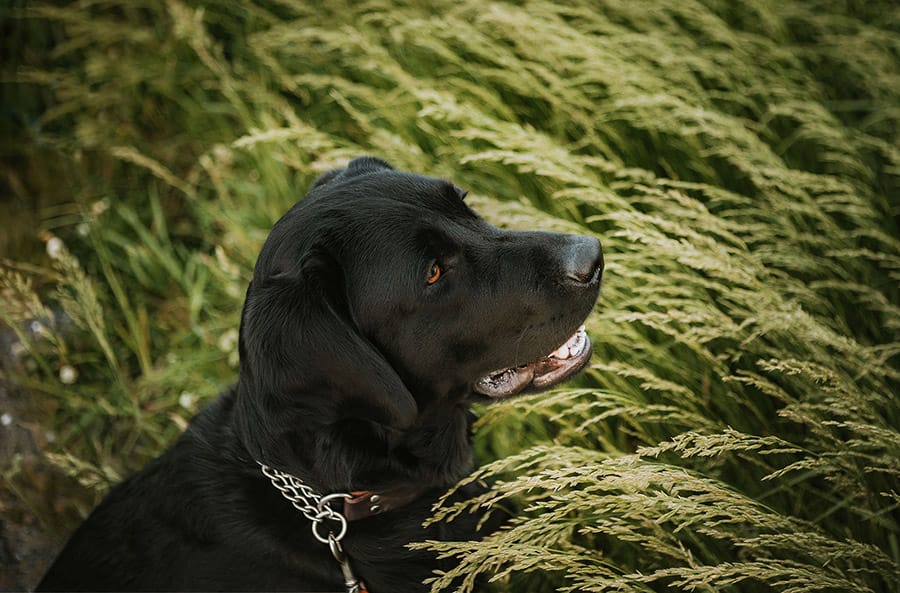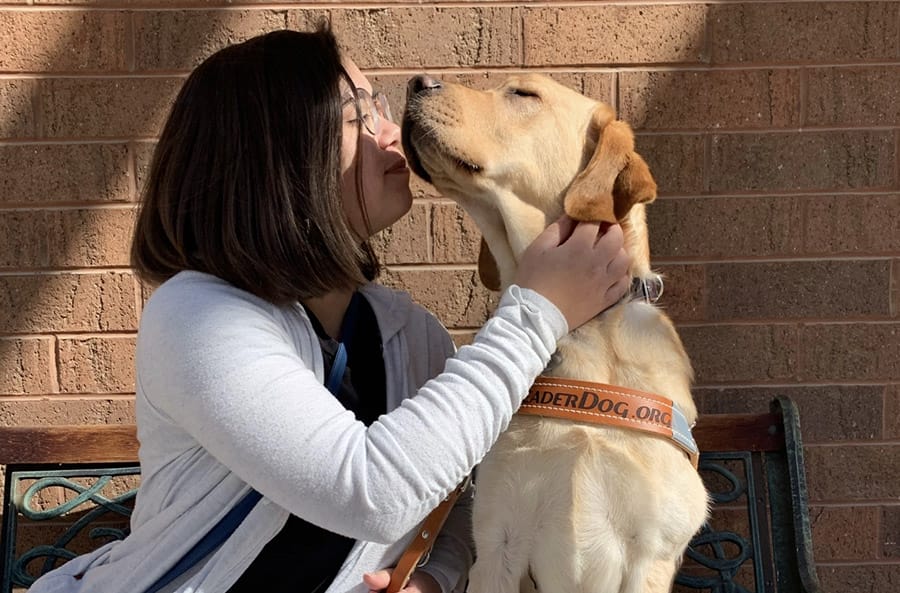
My name is Brooke Coleman and I’m a freshman at Christopher Newport University in Newport News, VA. I’ve been working with my best friend, Leader Dog Sampson, for a year now with our anniversary being on Halloween, but guide dog training wasn’t my first experience with Leader Dogs for the Blind. I’ve been a part of the Leader Dog family since I participated in their 2019 Summer Experience Camp and have been in love with the community ever since.
Through these next handful of posts, I hope to give you all insight into what it’s like living with a visual impairment and what it’s like working with Leader Dogs for the Blind.
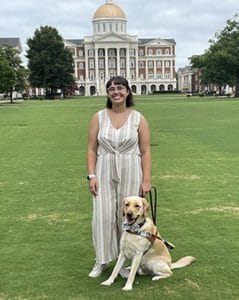 At Christopher Newport University, I am majoring in political science and double minoring in leadership and human rights. After I graduate from undergrad, I hope to be accepted into law school. My goal right now is to become a human rights researcher with a focus in disability rights. This would mean that I would have the opportunity to interview other disabled people and write about the struggles they face.
At Christopher Newport University, I am majoring in political science and double minoring in leadership and human rights. After I graduate from undergrad, I hope to be accepted into law school. My goal right now is to become a human rights researcher with a focus in disability rights. This would mean that I would have the opportunity to interview other disabled people and write about the struggles they face.
However, this isn’t necessarily my dream job. Ever since I was in kindergarten, my dream has been to become a published author. Since then, I’ve written the first draft for three full-length novels, each of which feature a visually impaired main character. My goal with my writing is to show people how blind and visually impaired characters can also be the hero of a story.
When I found out about my vision impairment, I was seven years old and I was diagnosed with retinitis pigmentosa, meaning I am night blind and have lost most of my peripheral vision. I was in first grade at the time and, as any seven-year-old would, I forgot about it until I moved up to second grade when I had to start orientation and mobility training with my long cane. That was the first time I realized how much this would impact my life. When I first started walking around with my cane, it didn’t take long for me to realize how many people would stare at me. Of course, I know now that it was out of curiosity because how often do you see a blind seven-year-old? At the time, though, all I knew was that it made me different from my peers, and I hated it. Naturally, I grew to hate my cane, as so many other blind and visually impaired people do. I refused to use it unless I was forced to by my orientation and mobility instructor.
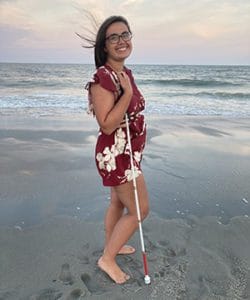 This put me in a lot of dangerous situations. I was completely dependent on my mom, sister, and the little vision I had left. If neither my sister nor my mom were there to provide sighted guide, I was constantly tripping over something or running into someone. As you can imagine, it didn’t work out well.
This put me in a lot of dangerous situations. I was completely dependent on my mom, sister, and the little vision I had left. If neither my sister nor my mom were there to provide sighted guide, I was constantly tripping over something or running into someone. As you can imagine, it didn’t work out well.
This continued until I was sixteen, when my orientation and mobility teacher came to me with the proposal of going to Leader Dog’s summer experience camp.
I still remember when my orientation and mobility instructor came in and told me about Leader Dogs for the Blind and their summer experience camp.
I was sixteen and looking for guide dog schools. My instructor knew this and was helping me with the process and came across Leader Dog’s week-long summer experience camp. We looked at the activities they had, and I immediately knew I wanted to go. I filled out the application, mailed it in, and anxiously awaited their response. When I heard back saying I was accepted, I was ecstatic.
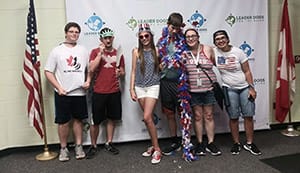 A couple months later, I was on a plane to Michigan for the best and busiest week of my life. As soon as I got there, I knew I was going to have an amazing time. I had the opportunity to experience so many things I never would have had the opportunity to had it not been for Leader Dog. They had tandem biking, ziplining, rockwall climbing, beep kickball, scavenger hunts, game nights, driving simulators, and so much more. The best part, though, was that I got to experience all these activities with other blind and visually impaired teens. I made so many friends that week, and to this day, three years later, I consider some of those people some of my best friends.
A couple months later, I was on a plane to Michigan for the best and busiest week of my life. As soon as I got there, I knew I was going to have an amazing time. I had the opportunity to experience so many things I never would have had the opportunity to had it not been for Leader Dog. They had tandem biking, ziplining, rockwall climbing, beep kickball, scavenger hunts, game nights, driving simulators, and so much more. The best part, though, was that I got to experience all these activities with other blind and visually impaired teens. I made so many friends that week, and to this day, three years later, I consider some of those people some of my best friends.
If you ask any of the alumni from summer experience camp what their favorite part of the week was, there’s a nine out of ten chance that they’re going to say, “Dog Day.” This is the day when we got to work with a guide dog and a guide dog mobility instructor (GDMI) to learn about what working with a guide dog is like.
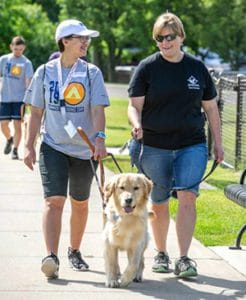 Dog Day is the day that everyone looks forward to. When I was there, we were all counting down the days until we got to work with an actual guide dog. Ever since I was diagnosed with retinitis pigmentosa, I knew I wanted a guide dog, but that day was what really sold it for me. As soon as I grabbed onto that golden retriever’s handle, I knew for sure that this was my next step in life, and as soon as I got home, I filled out the application for a guide dog.
Dog Day is the day that everyone looks forward to. When I was there, we were all counting down the days until we got to work with an actual guide dog. Ever since I was diagnosed with retinitis pigmentosa, I knew I wanted a guide dog, but that day was what really sold it for me. As soon as I grabbed onto that golden retriever’s handle, I knew for sure that this was my next step in life, and as soon as I got home, I filled out the application for a guide dog.
A couple weeks after I came back from Leader Dog’s summer experience camp, I got an email asking if I was interested in returning for their orientation and mobility (O&M) training. I knew that if I wanted a dog, I would have to improve my O&M skills, so I signed up for the next available week.
About a month after I got home, I was turning around and flying right back out to Michigan. This week was very different from camp, but it was just as impactful. This was the week that convinced me that I didn’t have to feel embarrassed about using my cane.
When I got there, I was assigned an O&M instructor who I worked one-on-one with throughout the week. At first, I definitely needed some polishing on the basics, but once that was done, we were able to move on to more difficult things, and by the end of the week, I was comfortable enough to do a drop-off where I was dropped off a couple blocks away from Leader Dog’s downtown center and I had to find my way back without the help of my instructor. It was definitely nerve-wracking at first, but when I was able to find my way back with ease.
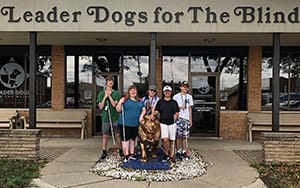 After that week, I realized I didn’t have to be embarrassed or ashamed of my cane. I learned how to be proud of my disability and the tools that I can use. I stopped letting fear prevent me from being independent, and I started using my cane more often rather than relying on my mom or sister to help me navigate the world.
After that week, I realized I didn’t have to be embarrassed or ashamed of my cane. I learned how to be proud of my disability and the tools that I can use. I stopped letting fear prevent me from being independent, and I started using my cane more often rather than relying on my mom or sister to help me navigate the world.
Like I said before, as soon as I got back from Summer Experience Camp in 2019, I applied for a guide dog. A couple months later, a week before my birthday, I found out I was accepted and they were waiting to find the perfect match for me.
Unfortunately, due to COVID, that process took a little longer than usual, but a couple days before my eighteenth birthday, I got the call saying they found a match for me, and on Halloween, I was introduced to my new best friend, Sampson.
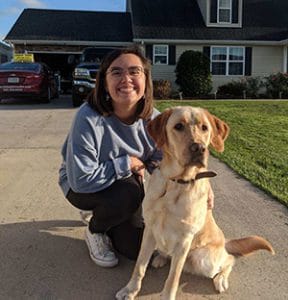 I still remember that day as if it were yesterday. The entire day I could barely sit still, knowing my dream would soon come true. Finally, around 6:00 pm, I got the text from my instructor saying they were about ten minutes out. My mom and I stood in the driveway, and as soon as I saw the blue and white Leader Dog van turn into our neighborhood, I immediately started crying. Sue, the instructor, brought Sampson around to me, and I knew we were meant to be.
I still remember that day as if it were yesterday. The entire day I could barely sit still, knowing my dream would soon come true. Finally, around 6:00 pm, I got the text from my instructor saying they were about ten minutes out. My mom and I stood in the driveway, and as soon as I saw the blue and white Leader Dog van turn into our neighborhood, I immediately started crying. Sue, the instructor, brought Sampson around to me, and I knew we were meant to be.
Ever since I got Sampson, I’ve been so much more independent. Before I had him, I used to dread grocery shopping, just like any sane person does, but afterwards, I would actually volunteer to go, just so I could work with Sampson more. Having him in my life has been like a breath of fresh air. He is my best friend, and I love him with everything I have.
For my last post, I would just like to say thank you to everyone who is involved with Leader Dogs for the Blind. None of this could have been possible without the trainers, the donors, the puppy raisers, and everyone else. There aren’t enough words in the English dictionary to express how grateful I am to have the Leader Dog family in my life. From the bottom of my heart, thank you for all that you have done for myself and everyone else.
See Brooke talking about her experience on YouTube.
Would you like to write a future installment of Voices of the Leader Dog Community? If so, please let us know! All emails will be answered, but we can’t promise everyone will have the opportunity to participate.
Read more about our Voices of the LDB Community initiative.

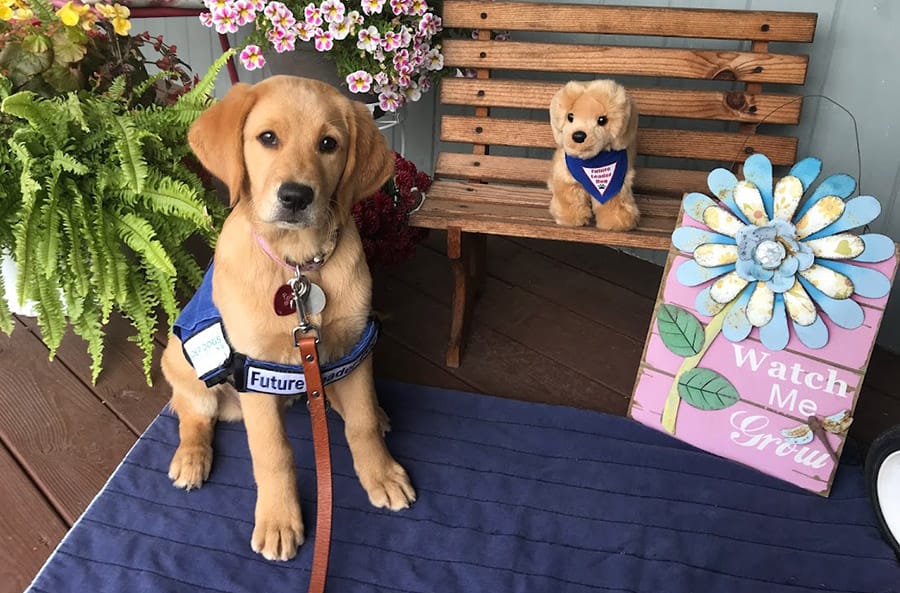
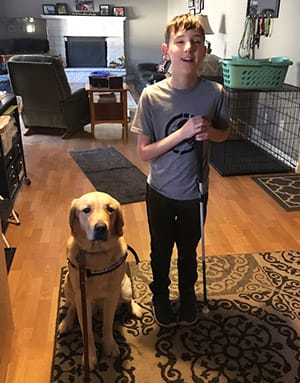
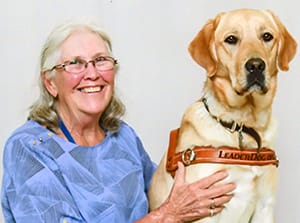
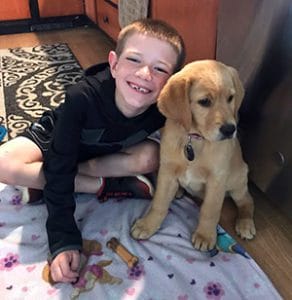
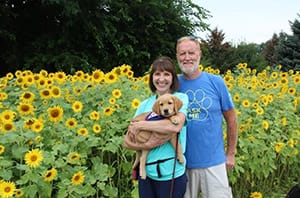 We have our sixth grandchild on the way, so we know we must raise at least four more puppies after Resi B, hopefully more! All our children and grandchildren love the puppies and the entire family pitches in to help.
We have our sixth grandchild on the way, so we know we must raise at least four more puppies after Resi B, hopefully more! All our children and grandchildren love the puppies and the entire family pitches in to help.